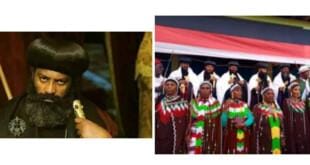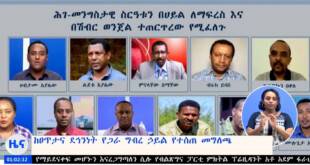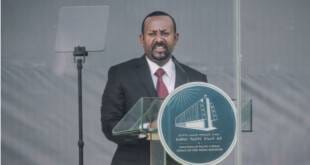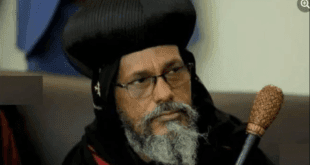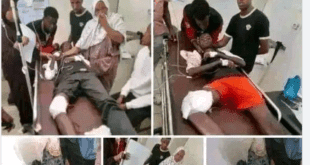Since the Ethiopian government announced plans to expand the territory of the capital Addis Ababa in April 2014, the country’s largest region, Oromia, has been racked with protests that have led to hundreds of deaths.
Oromia, which completely surrounds the capital of the Horn of Africa country, is home to the Oromo ethnic group. Oromos constitute the largest ethnic group in Ethiopia, yet members of the community claim to have suffered systematic discrimination and oppression at the hands of Ethiopia’s federal government.
Newsweek explains who the Oromo are, why they are protesting and how the Ethiopian government is responding.
Subscribe now – Free phone/tablet charger worth over $60
Who are the Oromos?
More than one in three Ethiopians hails from the Oromo ethnic group: Oromos constituted more than 25 million of the total 74 million population at the last census in 2007 (the population of Ethiopia has since grown to almost 100 million). The Oromo have their own language and culture distinct from the Amharic language, which is employed as Ethiopia’s official dialect.
The Oromo have been subject to human rights violations and discrimination under three successive regimes in Ethiopia, according to a 2009 report by U.S.-based Advocates for Human Rights group: the Abyssinian Empire under Haile Selassie, dissolved in 1974; the Marxist Derg military junta that seized power in 1974 and ruled until 1991; and the Federal Democratic Republic of Ethiopia, established in 1991 and existing until the present.
Oromo language was sidelined and not taught in schools for much of the 20th century and Oromo activists were often tortured or disappeared. A 2009 reportby the United Nations Commissioner for Human Rights (OHCHR) stated that 594 extra-judicial killings and 43 disappearances of Oromos were recorded between 2005 and 2008 by an Oromo activist group. The ethnic group have clashed with the ruling Ethiopian People’s Revolutionary Democratic Front (EPRDF), in power since 1991; an Amnesty International report in October 2014 stated that at least 5,000 Oromos were arrested between 2011 and 2014 on the basis of opposition to the government.
Why have Oromos protested against the Addis Ababa master plan?
According to the Ethiopian government, the Addis Ababa Integrated Master Plan proposed to expand the capital’s territory in order to bring better services and greater economic opportunities to the rural areas surrounding Addis. For the Oromos, however, the plan constituted an attempted land grab that could result in the forced eviction of Oromo farmers and the loss of valuable arable land in a country regularly plagued by drought.
Protests began in Oromia immediately after the plan was announced—at leastnine students were killed in April and May 2014, according to the government, although eyewitnesses said the total was at least 47. The most recent round of protests began in November 2015 and have spread across the entirety of the vast Oromia region. Human Rights Watch (HRW) reported in January that at least 140 protesters had been killed in demonstrations after heavy-handed crackdowns by security forces.
The Ethiopian government announced later in January that it was abandoning the Addis expansion plans after the Oromo People’s Democratic Organization (OPDO)—the ruling party in Oromia and a member of the governing EPRDF coalition—dropped its support for the scheme. Yet despite that, the crackdown has continued: HRW’s latest update on February 22 cited claims from activists that more than 200 protesters had been killed, with security forces allegedly firing on peaceful protesters and thousands detained without trial.

How have the government responded to Oromo protests?
The EPRDF has come down hard on protesters, claiming that “destructive forces”—including groups designated as terrorist organizations by the Ethiopian government—are hijacking the protests for their own means. Hailemariam Desalegn, the Ethiopian prime minister, said in December 2015 that protesters had burned down government properties and killed security forces, and that“merciless legitimate action” would be taken against those causing disorder.
In a statement sent to Newsweek on February 23, the Ethiopian embassy in London said that the claims made in HRW’s February report were based on “malicious statements, false accusations and unsubstantiated allegations from opposition propaganda materials.” The embassy claimed that the Addis expansion plans were dropped after “extensive public consultations” and an investigation into killings and destruction of property was underway.
Are Oromos seeking secession from Ethiopia?
One of the designated terrorist organizations accused of involvement in the protests by the Ethiopian government is the Oromo Liberation Front (OLF). The group was established in 1973 to campaign for the Oromo’s right to self-determination. The OLF is now based out of Washington, D.C. and any accusations of its involvement in the Oromo protests is a means of “criminalizing protesters,” according to Etana Habte, Ethiopian author and PhD candidate at SOAS University of London. “I don’t believe the OLF has very significant influence on this protest,” says Habte. “[Claims the OLF is involved] have not any relevance or grain of truth within itself. Oromo protests are fundamentally peaceful and it carries a legitimate question.”
Habte claims that what the Oromo are seeking is self-determination, not secession. Article 39 of Ethiopia’s 1994 constitution affords “every nation, nationality or people in Ethiopia” the “unrestricted right to self-determination up to secession.” What the Oromo are asking for, says Habte, is a greater say in how their region is governed. “Oromos understand Oromia as their own territory where they have an absolute and constitutional right to self-rule,” says Habte. “The Oromo protests don’t ask for anything more than [what is provided by] the constitution.”
